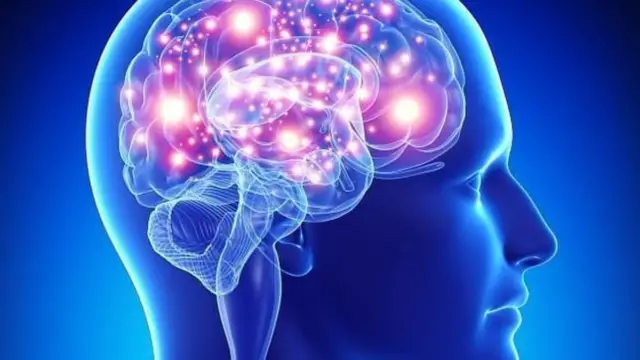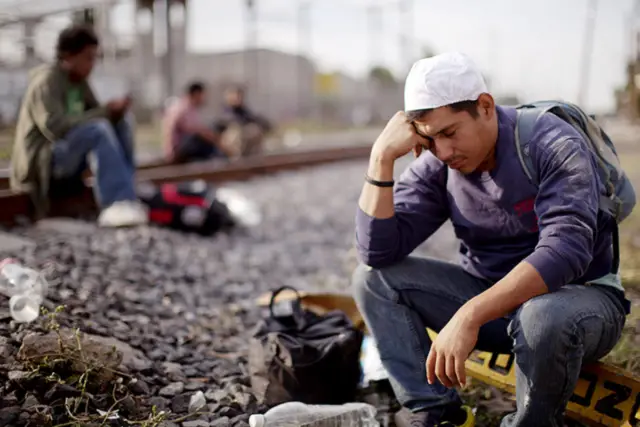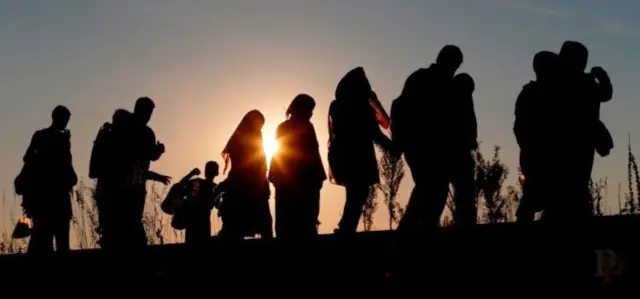“People should not be uprooted from their land or country, not by force,” said Argentine poet Juan Gelman. However, there are around 281 million international migrants in the world (3.6% of the population), according to 2020 UN data.
There are those who emigrate because they want to, but there are also those who are forced to do so. At the end of 2019, there were more than 79.5 million forcibly displaced people according to UNHCR.
Chosen or not, migrants, with roots thousands of miles away, may feel as Gelman said: like a “monstrous plant. And there will be circumstances on arrival at the destination that will soften that condition or make it worse. And this, without a doubt, can affect our mental health.
On the border between mental health and disorder
Spanish psychiatrist Joseba Achotegui works on issues related to migration at the World Psychiatric Association, of which he is secretary. From 2002 he began to see that something was changing.

“The borders were closed, tougher policies against migration began, people stopped having access to papers, there was a huge struggle for survival,” he said. And this was reflected in how patients came to his office: “They were helpless, scared, unable to get ahead. Specifically, he found that many migrants who live in difficult situations presented “a reactive picture of very intense, chronic and multiple stress”.
Achotegui named it: Ulysses Syndrome
The psychiatrist clarifies that this is not a pathology, since “stress and grief are normal things in life”, but he does highlight the peculiarity of the syndrome that leaves the migrant, once again, at the border. But this time between mental health and disorder.
Migratory duel vs. Ulysses syndrome
We normally associate the word “mourning” with the feeling after the death of a loved one. Psychologists relate it to any loss that the human being has, such as leaving a job, the separation of a partner or changes in our body.
“Every time we experience a loss, we have to get used to living without what we had and adapt to the new situation. That is to say, you have to prepare a duel”, explains the expert psychologist in migratory duel Celia Arroyo. Thus, migratory grief is associated with this great change in a person’s life. But it has characteristics that make it special, since it is a “partial, recurrent and multiple” duel.
Partial because it is not a total loss as occurs with the death of someone; recurrent because with any trip, communication with the country or taking a simple look at a photo on instagram it can be reopened; and multiple because it is not just one thing that is lost, but many.
Joseba Achotegui grouped these losses into 7 categories. The most obvious is usually the loss of family and loved ones. There is also the loss of social status, something that, says Arroyo, usually happens because of the migrant status but if, in addition, “the country of origin is xenophobic, it is a great adversity.” Another mourning that the migrant goes through is that of the loss of the land. For example, missing a mountainous landscape or sunny days.

The duel of the language is added, which will be stronger to the extent that one migrates to a country with another language. It can be a real barrier to, for example, go through a bureaucratic process and send a simple email. Lastly, there is the loss of cultural codes, which can mean something as simple as not having someone to “step up” and dance salsa or share a mate with.
And, associated with this, and as a last duel, is the loss of contact with the group to which we belong, with those with whom we can speak in the same codes, who will understand our mannerisms and way of seeing life. Ulises syndrome is when, in addition to having to go through these seven normal duels for a migrant, it is done in difficult conditions, explains Achotegui.
What are the triggers
“When there are difficulties or the person is rejected in the host society, this syndrome can occur,” explains Guillermo Fauce, professor of Psychology at the Complutense University of Madrid and president of Psychology without Borders.
It is not the same to arrive in a new country with a stable job than with nothing firm; to have or not a roof and food assured, to enter already with a visa or with a legal status to be defined. Having or not having certain conditions adds points and stress. “The rejection that can have the most impact is not having papers or not being able to access certain resources,” says the psychologist. In turn, Achotegui explains that this situation means that migrants cannot get ahead and generates tension and problems of survival, another trigger.
To the cocktail can be added not having people around us to give us support, not only material (where to live, eat, sleep), but also emotional. “Many migrants suffer situations of loneliness, they are isolated,” remarks Achotegui.

Fauce points out that there is also a symbolic support that, if not given, is yet another trigger. It is about the migrant’s environment understanding and recognizing his condition, “that he is going through a complicated situation, going through many duels and that he is allowed a transition period in the host society.”
Sometimes it can be thought that “the worst” is over after crossing a border in poor conditions, but, in the host country, the feeling of helplessness, of being without rights and possible labor and sexual abuse can lead to a fourth trigger : the fear. The experts consulted add that this situation of vulnerability that can give rise to Ulysses syndrome becomes greater when you are a woman.
What can happen to us and when to be alert
The symptoms can be the same, says Achotegui, that we can have when we go through a bad time: we sleep badly, we have trouble relaxing, muscle pain or headaches, anger, nervousness, sadness.
Fauce points out that, on the one hand, we can enter into a kind of depressive and sad state, of closing in on ourselves and, on the other, being hyperactive and anxious, something that in the end will take away our energy. This can cause Ulysses syndrome to be confused with other mental illnesses such as depression or post-traumatic stress and to try to medicalize it. But, in this case, when the obstacles that gave rise to the syndrome are solved (there is work, some stability, less stress, etc.), it disappears.
“If you go ahead, you get a job and there is a certain stability but there are still symptoms, there is something else to evaluate and you have to intervene in another way, because there may be something else on the psychiatric level, such as a depressive picture,” Achotegui maintains.
Thus, when the discomfort becomes permanent or prevents us from leading our lives, we must set off the alarms. Other signs of alarm that Fauce points out are if attacks of anger appear, our personal relationships are affected or “shortcuts are taken, such as consuming drugs, alcohol, there are excessive expenses or risky sports”.
What to do and what not to do
“It is essential to create a social support network, be in contact with other immigrants and share experiences,” says Celia Arroyo. For this it is good to look for migrants of our nationality or specific support groups where we live.
In this regard, Achotegui says that this means that there is “less risk of mental disorder”, but staying very anchored with our community can make it less prosperous. “If you don’t get into the host society, it will be difficult to progress. It’s a balance.” In the end, it is about maintaining “the root” with water, but not forgetting our leaves, the place where they receive the sun.
Achotegui also recommends exercising and activities that lower stress. Fauce remarks that “radical cuts do not work, nor do drastic decisions” either with respect to the country of origin or the host country and the relationships created in both.

Arroyo points out that, although it is difficult to give a precise time, if three months after having achieved stability the suffering we feel has not diminished, it is a good time to ask for psychological help.
What can others do
The host society plays an important role, but those who have not experienced this situation may not understand what migratory grief involves or the sustained stress that results in Ulysses syndrome. This can make us not know how to help, what to say or do.
Celia Arroyo recommends that the environment allow whoever is in this situation to express themselves freely and to be able to talk about what is happening to them and how they feel.
“It is important not to minimize their suffering or generate false hopes” in the face of an uncertain future when, for example, there is a visa or a job that does not arrive. As in any duel, you have to avoid phrases like “it’ll get over you”, “it’s no big deal”, “that’s your fears” or “everything will be fine”.
Achotegui suggests neither sympathizing nor victimizing: “You have to approach with respect, even with a certain admiration. The migrant is a strong person, someone who is going forward”.
At the same time, it is important to respect their culture, mentality and worldview. If it is difficult for us to connect emotionally with someone in this situation, Fauce reminds us that we have all suffered some loss and that it is a good exercise to connect with the emotion we had to empathize with the migrant. And to think that, as the Uruguayan Cristina Peri Rossi wrote, “emigrating, finally leaving, is always splitting in two”.

For those who have experienced shifts in consciousness and know that more peace, joy, and love awaits in a better living environment. A bold shared vision. A living community and hub for innovation. A sustainable ecosystem for living and working. A model for the new future.

